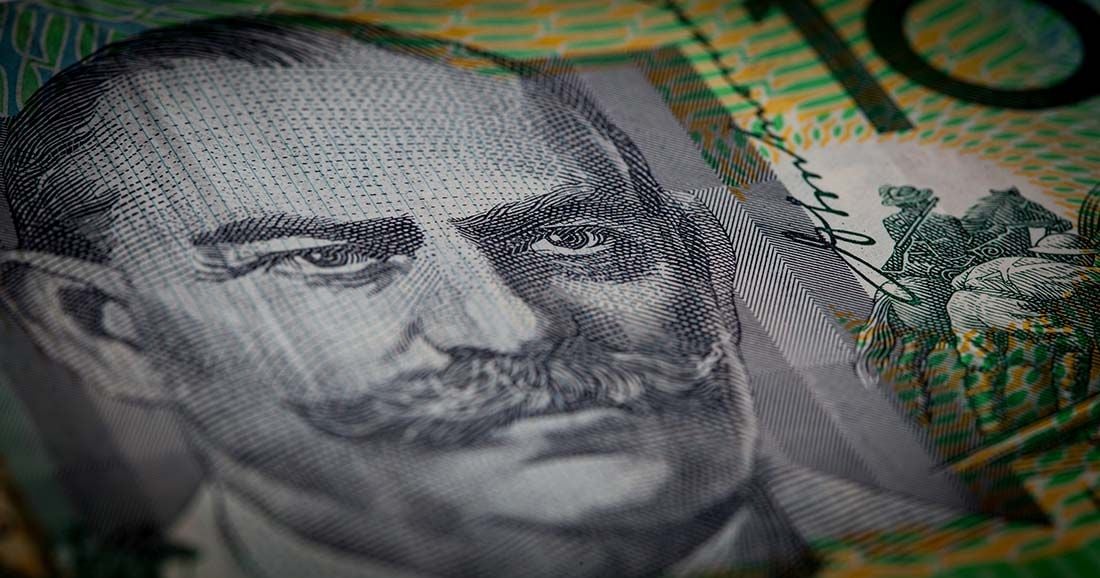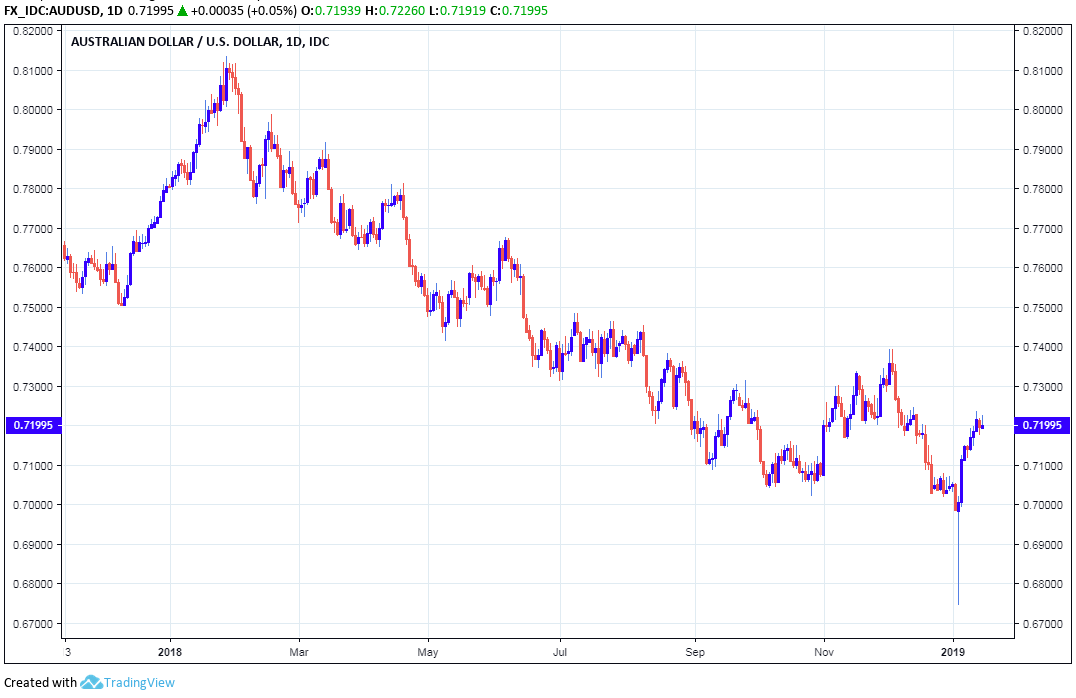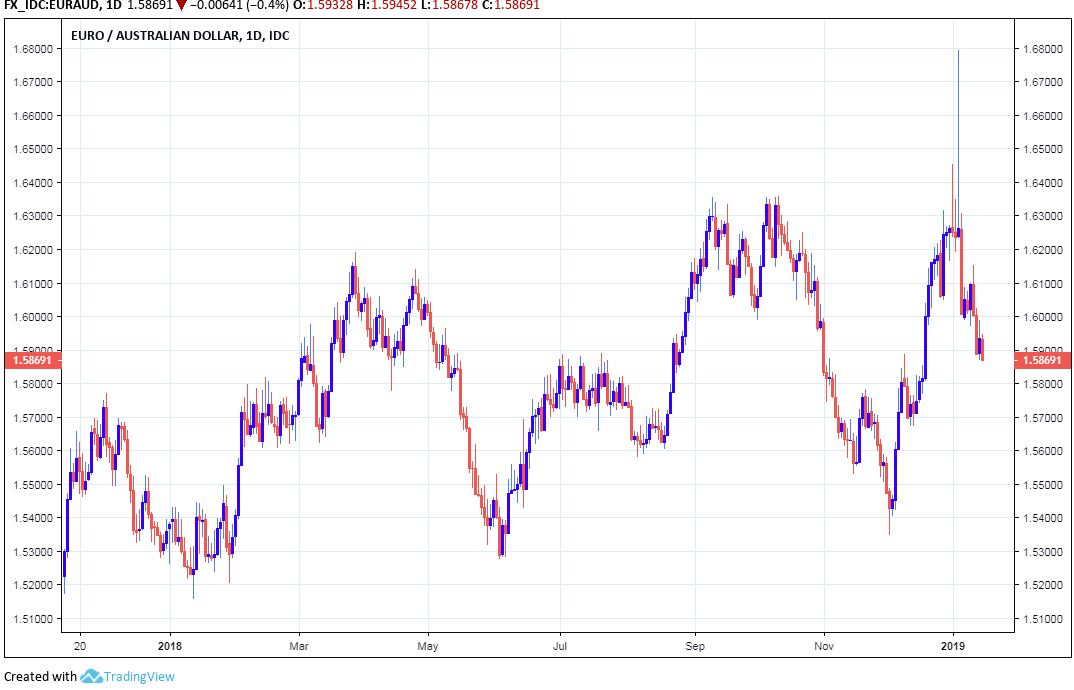The Australian Dollar: Bank of America says Buy as China Talks Tax Cuts
- Written by: James Skinner

© Greg Brave, Adobe Stock
- AUD rises after Chinese officials claim tax cuts are on way.
- Bank of America tells clients to sell the EUR/AUD rate.
- See AUD supported by risk appetite and EUR outlook darkens.
The Australian Dollar was lifted Tuesday by reports suggesting the Chinese government will cut taxes on a larger scale than previously thought in order to support the economy, fuelling support for so-called risk assets.
Meanwhile analysts at one of the world's largest lenders, Bank of America, have recommended buying the antipodean currency. They say it will be the biggest beneficiary of a China-related improvement in market risk appetite.
Officials from China's central bank and finance ministry told reporters Tuesday that long-mooted tax cuts will now be on a "larger scale" and that they will target small businesses as well as the manufacturing sector, according to a report from The South China Morning Post.
"After yesterday's awful Chinese trade data, this morning brings promises of further tax cuts and a bounce in sentiment that sent all Asian equity indices higher, and dragged the yen to the bottom of the overnight FX rankings," says Kit Juckes, chief FX strategist at Societe Generale.
The move comes as analyst forecasts of an economic slowdown in China during 2019 grow in number and barely a day after trade balance data showed Chinese companies and consumers struggling beneath the weight of White House trade tariffs in December.
Imports from the rest of the world fell by -7.6% in December while exports also declined broadly, by -4.4%, as companies and consumers grappled with the combined effect of weaker exchange rates as well as homemade tariffs on goods imported from the U.S.
"The more the Chinese authorities use fiscal policy to help manage the economic slowdown, the longerthey can avoid triggering CNY weakness, which would support the dollar more broadly. China's slowing economy does, however, reinforce the risk that the global economic cycle has turned lower more sharply than some realise," Juckes adds.
Chinese economic data matters to the Australian Dollar because the Antipodean currency is underwritten by a significant commodity trade with the world's second largest economy. This means the Aussie is sensitive to news impacting China's economy and currency as well as the outlook for global growth.
Given its close correlation with the Renmimbi, Australia's Dollar has been badly damaged by the U.S. trade war with China, which pushed the AUD/USD rate almost 10% lower during 2018. But the currency has also been sensitive to reports of progress in talks to end the tariff fight, which have helped to lift the currency thus far this year.
"The AUD remains trapped in range as weak Chinese data reminds the market of deteriorating global growth, but more dovish Fed speak eases concerns a touch. This arm-wrestle is set to continue in the near term," says David Plank, an economist at Australia & New Zealand Banking Group.

Above: AUD/USD rate shown at daily intervals.
The AUD/USD rate was quoted -0.20% lower at 0.7213 during early trading Tuesday but is up 2.2% for 2019, while the Pound-to-Australian-Dollar rate was -0.20% lower at 1.7849. The EUR/AUD rate was -0.29% lower at 1.5891 and has fallen -2.1% this year.

Above: EUR/AUD rate shown at daily intervals.
"We are establishing a tactical short EUR/AUD trade against the backdrop of mounting evidence from BofAML strategists that risk markets are on the cusp of a tactical rally," says Kamal Sharma, a currency strategist at Bank of America Merrill Lynch. "We sell EUR/AUD at 1.6070, targeting 1.5280."
Sharma and the Bank of America team are betting the Australian Dollar will rise against the Euro over the coming days and weeks, as investors' appetites for risk improve in response to policymakers' efforts to support the Chinese economy and as negotiators from both sides edge closer toward a deal to end the so-called trade war between the world's two largest economies.
Bank of America's proprietary Bull/Bear indicator and other measures of investor sentiment suggest "risk assets" like the Australian Dollar and the S&P 500 stock market will rise during the weeks ahead.
This is happening just as the outlook for the Euro currency turns darker. Bank of America says both the German and Italian economies are now likely in recession, and that other economies across Europe are decelerating rapidly.
This is darkening the outlook for European Central Bank (ECB) monetary policy, which matters for the Euro because the single currency's recent appeal to investors has been contingent upon the idea the central bank will lift its interest rate from record low levels once "through the summer of 2019".
"The ECB should be in no hurry to hike rates this year. Our medium-term conviction in a higher EUR remains intact, but unless the Eurozone data flow improves, we find it hard to make the case for an imminent recovery," Sharma writes, in a note to clients.
The Reserve Bank of Australia (RBA) is not expected to raise its own interest rate any time soon and the economic situation on the ground in Australia is also increasingly precarious, although Bank of America says market sentiment toward the Aussie should improve as investors' moods lift with progress in the U.S.-China trade talks.
Chinese officials said last Thursday that talks have laid "the foundation for resolving issues" over the coming weeks, raising hopes that a deal to end the tariff fight can be reached before March 01, which is when the 10% tariff charged on $250 billion of Chinese exports to the U.S. will automatically rise to 25% if no agreement is struck.
Should this kind of rhetoric continue to trickle out of Beijing during the remainder of January then the Australian Dollar will remain on its front foot and could outperform currencies like the Euro.
Bank-beating AUD exchange rates. Get up to 5% more foreign exchange by using a specialist provider to get closer to the real market rate and avoid the gaping spreads charged by your bank when providing currency. Learn more here




